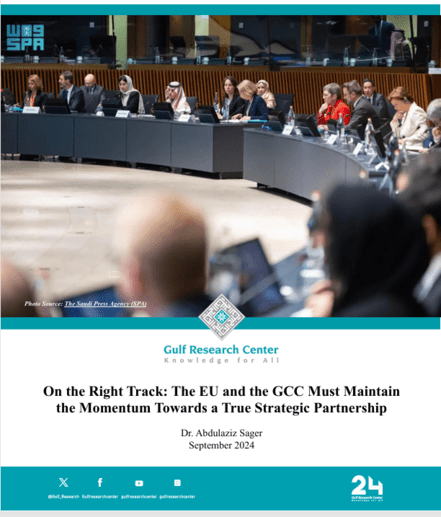Select any text and click on the icon to listen! ByGSpeech
ByGSpeech
 ByGSpeech
ByGSpeech ByGSpeech
ByGSpeech
In June 2022, the EU Council of Ministers approved the Joint Communication of the European Union on a “Strategic Partnership with the Gulf,” marking the latest attempt to provide a more formal framework for GCC-EU relations to develop and strengthen their mutual ties. The GCC reacted positively to the declaration and it has since been used as a framework for reflecting on and pursuing the shared interests of the two parties.
The June 1988 Cooperation Agreement, signed only seven years after the GCC’s creation, established the close historical links between the GCC governments and Europe. These links, rooted in shared economic and security interests, have experienced highs and lows over the years but have continued to grow and improve, laying the foundation for the current institutional ties.
The GCC-EU relationship has made significant strides in recent years, with numerous initiatives outlined in the Strategic Partnership document from 2022 coming to fruition. These include the appointment of Luigi Di Maio as the first EU Special Representative for the Gulf Region in June 2023, a role that underscores the EU’s commitment to the region and its desire to foster closer ties. This was followed by the successful hosting of the first structured GCC-EU Regional Security Dialogue in January 2024 in Riyadh, the GCC-EU High-Level Forum in Luxembourg in April 2024, and the opening of the GCC-EU Chamber of Commerce in Saudi Arabia in May 2024. On October 16, 2024, the two sides will hold the inaugural summit meeting at the heads of state level in Brussels, with the intention of holding such a summit every two years thereafter.
The Strategic Partnership document prioritizes “security in the Gulf” and emphasizes that “peace and stability in the Gulf” directly impact the EU’s security and economic interests. The EU’s increasing interest in the Gulf is a testament to the region’s growing significance in the global arena. This interest is not just a response to the challenges facing Europe in the context of the Russian-Ukrainian crisis, but also a recognition of the Gulf’s potential to contribute to global issues such as countering terrorism and extremism, clean energy, nuclear safety, and cybersecurity.
However, there are still crucial steps that the EU needs to take to transform the relationship into a true partnership. One such area is visa facilitation. While EU member states enjoy unrestricted entry into the GCC states, GCC nationals, aside from the UAE, still face many obstacles to visiting EU countries. It is imperative that there be GCC-wide visa-free access to the EU countries, not just for bureaucratic reasons, but as a crucial element for fostering the people-to-people network that the EU consistently highlights (rightly-so) as essential. There is a strong sense in the GCC states that the EU needs to demonstrate the necessary political will to resolve this issue.
Another area is the Free Trade Area Agreement, where talks were suspended by the GCC in 2008 after the EU’s consistent demands for concession by the GCC. A renewed effort should be undertaken to restart the FTA negotiation. Still, the EU needs to be ready to accommodate GCC interests, especially regarding the energy transition issue. As significant energy producers (from which the EU will directly benefit given its own crisis in energy dependency), EU demands on carbon pricing and the phase-out of fossil fuels have to be adjusted to reflect a common and more equitable approach.
While there has been improvement, especially through EUSR Luigi Di Maio, the EU still needs to be more attentive to its GCC partners, especially when it comes to the critical issues of regional security. For the GCC states, regional security is the top priority in relations with the EU. The primary sources of threat include Iran’s nuclear program and Iranian interference in the affairs of Arab countries. The development of Iran’s nuclear capabilities represents a direct threat to the stability of the region. It will undoubtedly lead to a tectonic shift in the regional balance of power if Iran manages to acquire a nuclear weapon, as the IAEA recently warned.
The GCC has voiced their concerns for many years on specific issues, but their concerns should have been taken more seriously in Brussels. It was, for example, only in November 2022 that EU Commission President Ursula von der Leyen acknowledged at the Manama Dialogue that on the issue of Iran, the EU should have been more receptive to GCC analysis beforehand. The same can be said for the crises in Syria, Libya, Sudan, Yemen, and most recently, the crisis in Gaza. On all fronts, better dialogue is required.
Finally, there is concern in the GCC about the increased securitized environment concerning migration as far as Europe is concerned and the rise of right-wing populist parties and movements. There has been a deeply concerning rise in Islamophobia coupled often with unjustified accusations aimed at GCC states. One way to address this is by solving the visa issue, thereby increasing people-to-people contact and dispelling fears and concerns on this front.
In conclusion, the EU’s strategic partnership with the GCC has made significant progress in recent years, with various initiatives and dialogues aimed at fostering closer ties and addressing mutual interests. However, the EU still needs to take the necessary steps to transform the relationship into a true partnership. By resolving the issues outlined above and continuing to work together, the two sides can see their partnership expand and provide a direct contribution to regional peace, stability, and prosperity.
*Dr. Abdulaziz Sager is the Chairman of the Gulf Research Center